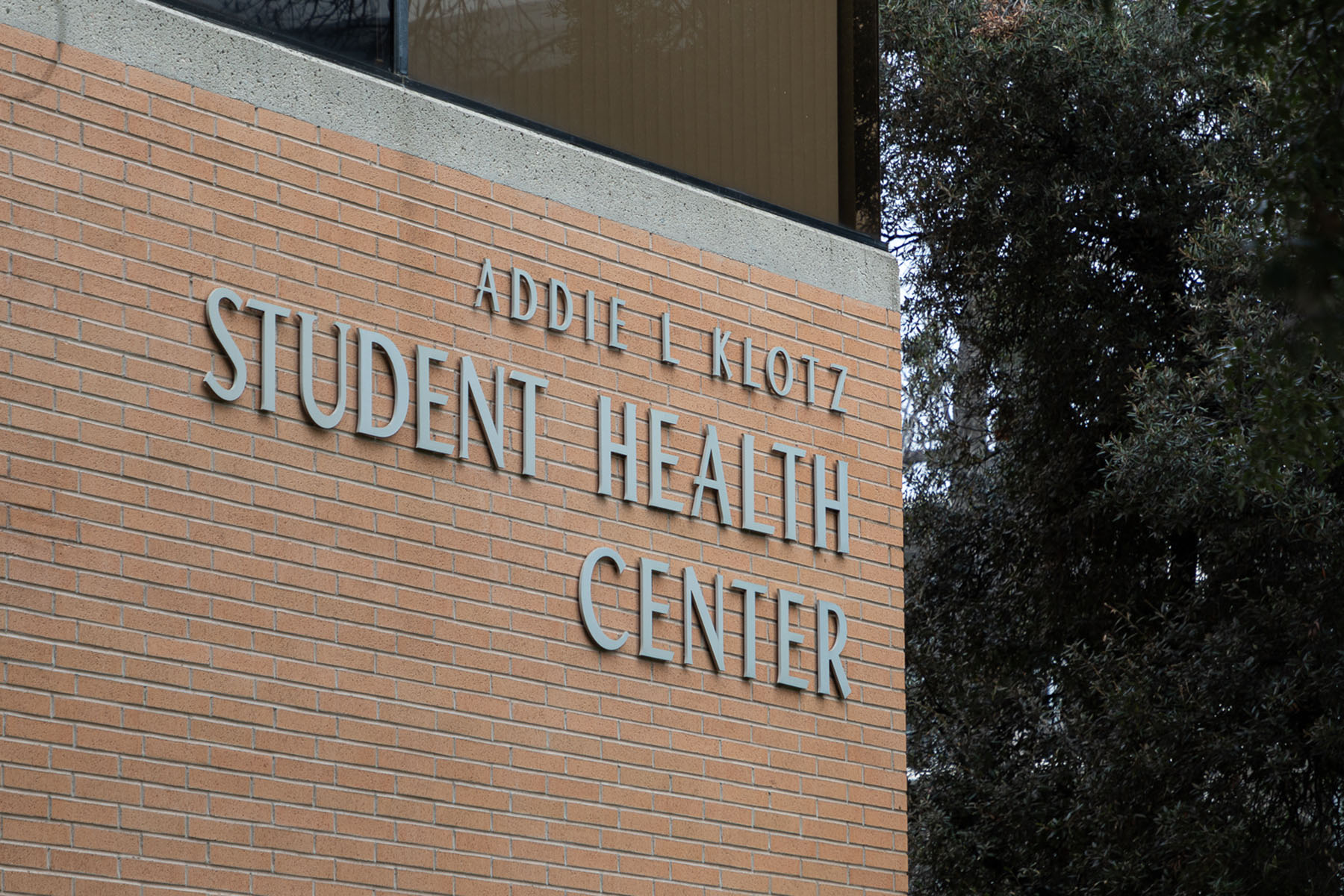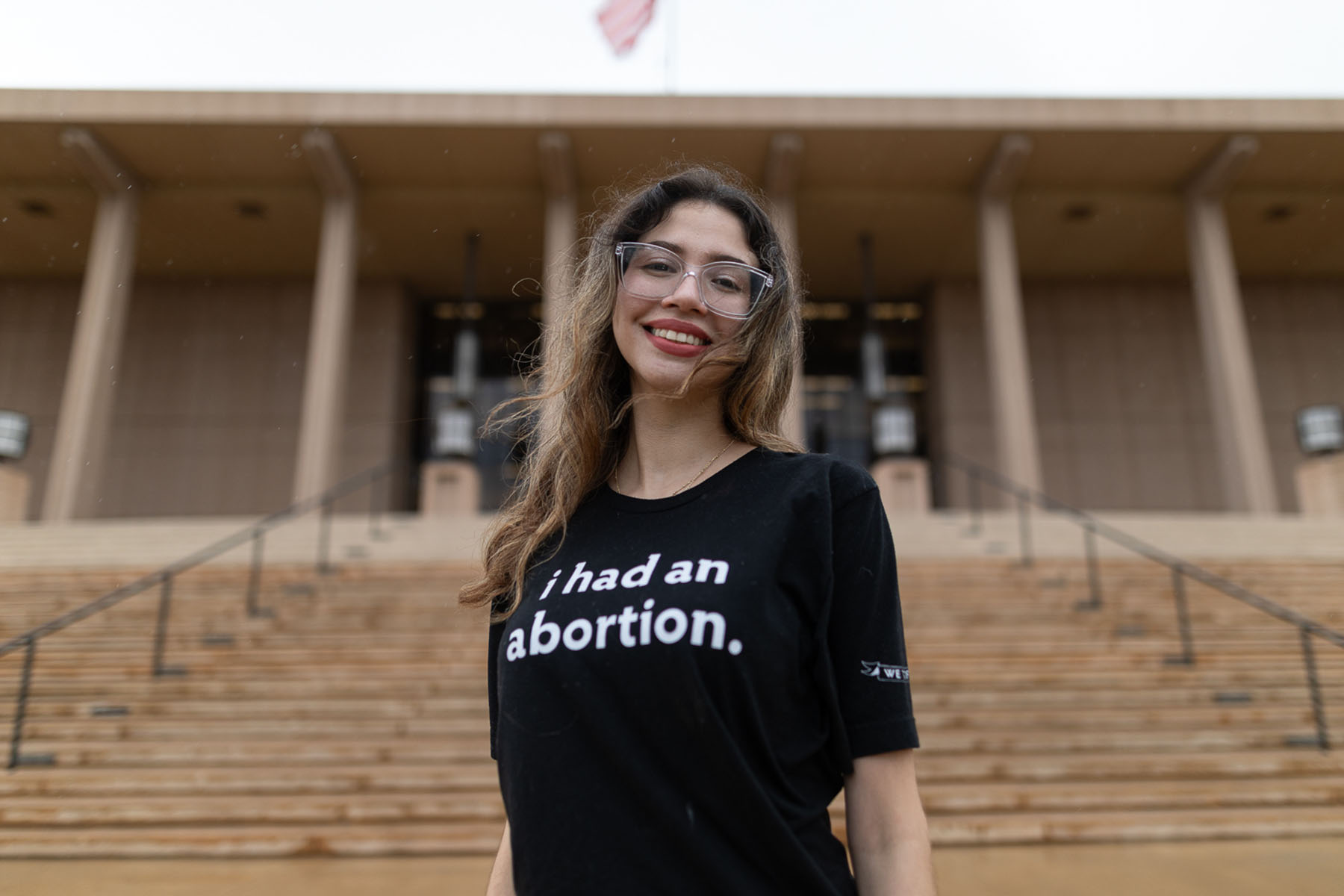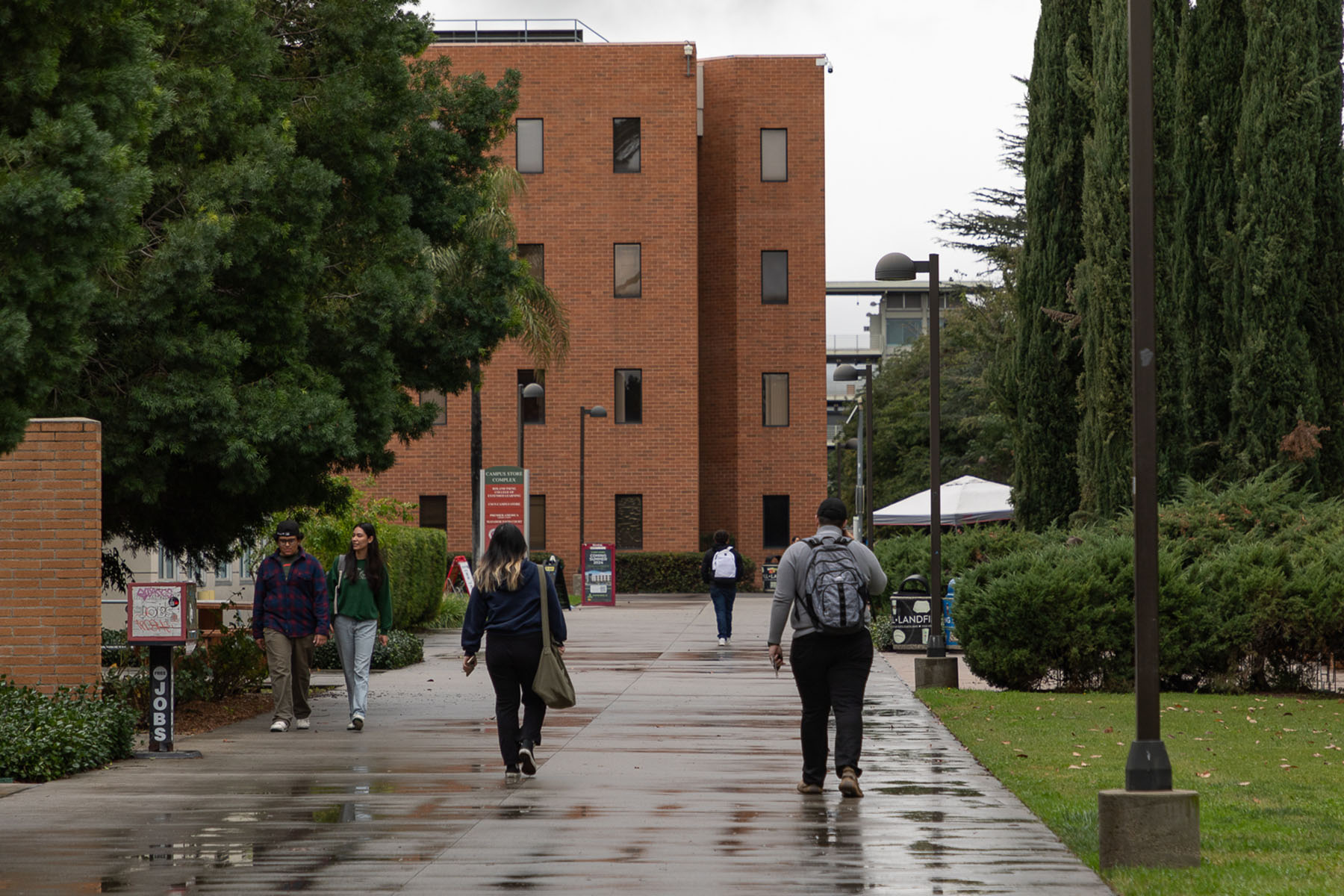This article was originally published by LAist on January 31, 2024.
When Deanna Gomez found out she was pregnant in September 2023, it turned her world on end.
She was a college senior in San Bernardino and didn’t feel ready to have a baby. She was working two jobs, doing well in her classes, and she was on track to graduate in December.
She used birth control. Motherhood was not in the plan. Not yet.
She decided her best option was a medication abortion. It’s a two-step process: One pill, taken at a doctor’s office; another pill a day later to induce cramping and bleeding and empty her uterus.
She ended up driving more than 300 miles to three medical offices and paying hundreds of dollars in medical and travel expenses. She missed a month of classes, which put her graduation date from Cal State San Bernardino in jeopardy.
She had no idea she was entitled to a free medication abortion right on campus.
An LAist investigation has found that one year after California became the first state to require its public universities to provide the abortion pill to students, basic information on where or how students can obtain the medication is lacking and, often, nonexistent.
“I was really upset when I found out,” Gomez told LAist. “I had to really push myself to make that money happen.”
LAist found that nearly half of California State University (CSU) campus clinics do not have any information about medication abortion on their clinic websites, nor do they list it as a service offered. Of University of California’s 10 campuses, eight mention abortion on their clinic websites.

Through conversations with students and faculty at multiple campuses, LAist found that many universities haven’t told students that the abortion pill is available to them. Having that information would likely reduce stress for many people dealing with unwanted pregnancies and give them more autonomy and control over the process.
“They say they are trying to be part of the solution, but they’re not,” Gomez said of campus leadership. “They’re becoming part of the problem.”
‘This law is more important than ever’
In 2019, California legislators introduced Senate Bill 24, which would require all of the state’s 33 public universities to provide the abortion pill on campus.
That year was one of the most contentious on record in the nation’s ongoing debate about abortion rights. California and eight other states moved to protect and expand abortion access. Legislators in 17 other states moved to restrict it.
“We wanted to make sure that students, female students, had access to this right,” said Connie Leyva, the former Pomona-area state senator who authored the bill.
People who give birth while in college are less likely to graduate than those that do not, according to research based on federal data.
California’s legislature created a $10.2 million fund of privately raised money to help universities implement the new law. Each campus received $200,000 in one-time funding to pay for the medication and cover costs such as facility upgrades, equipment, training, telehealth services and security upgrades.
(Leyva said community colleges weren’t included in the requirement because “most” of them do not have health services on campus.)
The funding did not include any requirement that campus clinics inform students the medication was available to them.
Leyva said she doesn’t recall any conversations about “including something on advertising that you could get a medicated abortion on campus.” That said, she added, “it definitely wasn’t ever taken out of the bill.”
-
Read Next:
Until recently, San Bernardino was one of 11 California State Universities that did not list medical abortion as a service available on campus to the student body.
A spokesperson said UC President Michael Drake was not available to comment.
“The student communities at each UC campus are unique,” said Heather Harper, the spokesperson for UC Health in Drake’s office, via email. “As a result, communication to students at each location takes different forms and may include website content, flyers, emails, person-to-person conversations or other methods.”
The office of CSU Chancellor Mildred García did not reply to a request for comment.
‘I did not want to be pregnant’
In January 2021 — two years before SB 24 would go into effect — Diana Venegas was three semesters away from graduating from Cal State Northridge. Venegas took a pregnancy test and it came out positive.
“I started crying because I did not want to be pregnant at all,” they told LAist.
Venegas jumped on the phone to find where to obtain medication abortion.
“And then I continued crying because I looked at the cost,” Venegas said, recalling that the estimate at the time would have been around $200, not including transportation expenses.
Venegas worked as a resident advisor in the college dorms, which provided free housing. But, they said, their monthly budget was tight.

“I love my abortion. It saved my life in a million ways,” they said. But Venegas had a lot of difficulty along the way, in part because of a lack of resources they could turn to.
“It just sucked that nobody was there to celebrate one of the best things that I’ve done in my life,” they said.
Venegas now works in the public health field as a clinical researcher. They also work as an abortion doula through the Los Angeles Abortion Support Collective.
Who the law was designed for
Venegas was the kind of student SB 24 was designed to help. So was Deanna Gomez.
Gomez found out she was pregnant in September. The new law was already in place.
For her, the timing of the pregnancy couldn’t have been worse. She was working up to 60 hours a week at two jobs, while taking a full class load. With a December graduation approaching, she was weeks away from becoming the first person in her family to earn a bachelor’s degree.
At this point in her life, she said, she couldn’t provide for a child.

“I grew up in poverty,” Gomez explained. “It’s something that you remember and I don’t want that for my children.”
Had she been aware that she could have accessed services at the campus clinic, she would have done it without question, she said.
“I was under the impression the clinic was for basic health needs, like when you need a flu shot, when you need a physical. Because that’s how it was explained to me,” she said.
Gomez transferred from community college to Cal State San Bernardino in 2022. She attended the university’s orientation that year. She said she doesn’t recall any mention of the abortion pill being available to students on campus the following January.
Because Gomez had private health insurance through her parents, she had never gone to the campus clinic for care.
-
Read Next:
‘We need to work harder and better’
Even if Gomez had checked the clinic website, she wouldn’t have known abortion pills were available.
Beth Jaworski, Cal State San Bernardino’s executive director of health, counseling, and wellness, acknowledged medication abortion is not on the clinic website, saying “it’s not an exhaustive list of everything we provide.”
She said students can see that information when they log into the patient portal. LAist was unable to independently verify her statement. She also mentioned that information is posted in patient rooms and clinic restrooms.
Medication abortion isn’t noted on any of the posters on the clinic doors, in the lobby or pharmacy, or around campus. Jaworski said providers and nurses are trained to discuss — “and are expected to discuss” — all pregnancy options.
Jaworski said the campus clinic has provided medication abortions in compliance with the law through a telehealth service. She would not disclose a specific number other than to say “single digits.”
“I absolutely think we need to work harder and better if there is a student who needed the service and wasn’t aware that they could access it through us and not have to pay for it,” Jaworski said.
She said she doubts there are many students who have missed out, and she doesn’t think the lack of information limits access.
“It’s one student,” she said, referring to Gomez. “We haven’t been providing the service very long. It’s been just about a year now.”
Jaworski said medication abortion was referenced in health center presentations that students could attend — which were scheduled during hours without classes — and also in social media posts and the school bulletin. She did not provide examples to LAist.
After the interview with LAist, medication abortion appeared on the CSU San Bernardino health clinic website as a service the university offered.
Falling behind
Not knowing that free medication abortions were offered on campus, Gomez figured her best bet for getting care would be the nearest Planned Parenthood in Upland. She said she found the interaction with a staff member there unwelcoming so instead drove to another location, more than an hour away in Pasadena. (LAist reached out to the Upland office but was unable to connect with someone in time for publication.)
When Gomez arrived for her appointment in Pasadena, she was met by anti-abortion protesters holding signs near the parking lot.
“They were saying, ‘You don’t love Jesus, you’re going to hell,'” Gomez said. “I don’t think I’m going to hell. I don’t think forcing myself to have a child that I know I can’t provide [for] makes me a bad person.”
Gomez paid $575 for the exam and medication, and took the first pill while at the Pasadena Planned Parenthood.
She took the second drug at work the next day, during her lunch break. Days later, she continued to feel nauseated. Exhausted from the 60-hour workweek, she skipped classes. She missed nearly all of her classes in October, she said.
“I attended maybe one or two classes, and that really put me behind,” she said.
At a checkup a month later, Gomez discovered she was still pregnant.
“I asked the nurse, ‘Do you know why it wasn’t successful? I did everything I was supposed to,’ and she said, ‘they are 96 percent successful.’”
Gomez decided not to try another medication abortion. Staff at Planned Parenthood in Pasadena told her she’d have to pay an additional $575 for another round of medication, and she didn’t trust it to work.
-
Read Next:
Instead, Gomez opted for a dilation and curettage, or D&C, an outpatient procedure that clears pregnancy tissue from the uterus. She wasn’t charged, because it was part of her ongoing care, but the only available appointment was at another Planned Parenthood location in Baldwin Park, more than 40 miles from her home in the San Bernardino area.
Gomez worked overtime shifts to make up for lost pay and said two of her professors insisted on receiving doctor’s notes before giving her more time to do her assignments.
If she had been treated on campus she would have saved hundreds of dollars and dozens of hours of lost travel time. And there was a toll on her state of mind.
“Emotionally, it would have taken a lot of stress off of me,” she said.
She also likely would have avoided protestors. University campuses restrict protests to specific times and places, away from dorms and the campus health clinic.
Big gaps in communication
LAist’s survey of campuses that did post information about medication abortion found significant variation. Those different approaches, some students and faculty said, may signal what’s important to university leaders.
Some campuses placed information about medication abortion on the main page of their respective student health center’s websites. Others did not.
At Cal Poly Pomona, information on the process is three clicks away from the health center’s main page, starting with a dropdown of health topics. Rita O’Neill, director of the student health center, said the university tries to balance essential health care and politics.
“I think we wanted to just approach it very thoughtfully so that we could provide good, high touch, empathetic, compassionate care,” she said, “with the recognition also that there may be some controversy with some people around this area of care.”
O’Neill said staff at the center have talked about medication abortion and other reproductive health services in gatherings with members of the campus cultural centers. She has not seen an all-campus email from administrators that mentions the availability of medication abortion.
“The more intimate safe space that you can create, the more impact you can have for students,” she said.
On some websites, no mention of medication abortion
UC Santa Cruz has a webpage for pregnancy options. The site does not mention that state law requires the university to provide medication abortion.
Campus spokesperson Scott Hernandez-Jason said in an email that the university is working to update the website. “In the meantime, we are continuing to provide outreach to students about the services we offer via a variety of channels,” he said.
UC Merced’s website also doesn’t mention medication abortion on its website. Spokesperson Sam Yniguez said the health center notifies students about services in a variety of ways, including peer education, tabling events, fliers, and social media posts.
“Students also learn about health resources available during orientation,” Yniguez said.
In contrast, Cal State Fullerton’s website notes that medication abortion is a provided service and explains the process.
But getting that information on the website took a push from faculty on campus who knew about the requirement, according to Karyl Ketchum, the Women and Gender Studies department chair. She said the information was not available on the website when the law went into effect last year.

“I saw no preparation for this around campus at all. There was certainly no discussion of it in the Academic Senate at all, zero,” Ketchum said. The Academic Senate is the representative body that debates matters of teaching and learning.
She said the information was added to the site three months later.
“[Outreach] would be happening in the women’s center,” Ketchum said, but the university closed it in 2022 with no warning. Cal State Fullerton did not respond to a request for comment.
-
Read Next:
Is the law fulfilling its promise?
In 2018, a study in the Journal of Adolescent Health found that more than 500 women at public universities seek a medication abortion every month in California.
State data released in December reported that UC and CSU campus clinics provided just 365 medication abortions in the first six months after the law went into effect.
Those numbers raise questions, including to what extent public universities are underserving students’ medication abortion needs.
The University of California system enrolls more than 155,000 women, just over 4,400 nonbinary students and 625 trans men. Between July 2022 and June of last year, UC campus clinics provided 203 medication abortions.
The California State University system enrolls more than 457,000 students (261,000 people who identify as women or transgender men, who also qualify for services; CSU does not track data on nonbinary students). CSU’s 23 campus clinics provided 162 medication abortions. Asked why they might not have provided more when studies suggest there should be higher demand, campus staff pointed to outside factors.
“I think that there are many students who are having abortions who are still not coming to our center,” said Susan Flaming Yeats, director of the student health center at Cal State Dominguez Hills.
She said there are multiple abortion providers around the South L.A. County campus. Three centers that provide abortion pills are located within six miles of Cal State Dominguez Hills.
She also said students who want a medication abortion may not want to be seen walking into the student health center.
Flaming Yeats said her center provided six medication abortions in the one year that the law has been in place.
Her center needs to do more outreach, she said, and that would include talking to academic deans so that the information can trickle down to faculty and students.
Flaming Yates said there are a lot more students they could serve, and “that marketing piece is going to be pretty critical for us.”
Former lawmaker urges a fix
Leyva, the former senator and author of SB 24, said the law is “falling short” of what was intended when Gov. Gavin Newsom signed it into law.
“I would love to see someone who’s still in the legislature take that up and make it a requirement that the schools have to provide the information so that the students know,” Leyva added. “That way they know they have access.”
Student health center medical staff — who can opt out of providing medication abortion care — say the law directed them to provide a service they’d never provided before.
“This is not something that these practitioners have ever done… and it’s not because these people don’t believe in this,” Yeats said.
Yeats said she stressed to her Cal State Dominguez Hills health center team that providing medication abortion would improve access to health care for students.
“We know that our students are getting abortions, the numbers tell us that,” she said. “We know our students don’t have easy access to transportation, it’s a barrier for them to get to these other places for this service.”
Not so secret
Gomez graduated in December with a degree in sociology. But it didn’t need to be so difficult. She’s angry at her alma mater, and feels administrators are keeping the abortion pills a secret.
Gomez thinks fliers, posters, emails, and Instagram posts, directed toward both faculty and students, would go a long way.
“You want to market the football games. You want to market the volleyball games,” she said. “Why is that important and abortions are not?”








